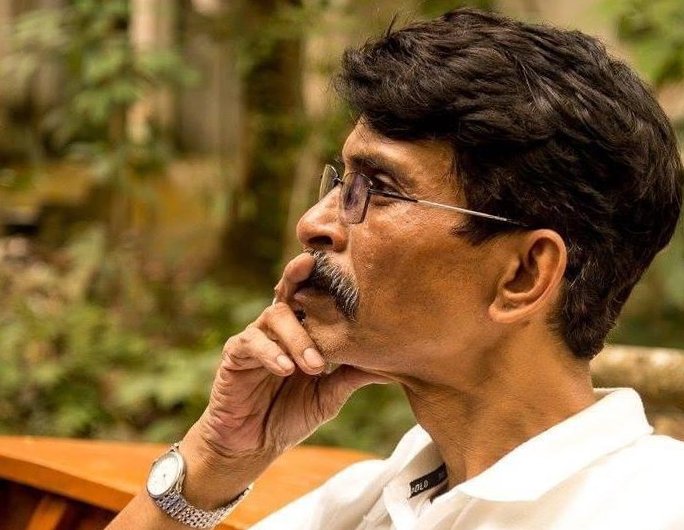Bangladesh: PEN International calls for an investigation into the untimely death of imprisoned writer Mushtaq Ahmed
Mushtaq Ahmed (courtesy of Lipa Akther and CPJ)
Update - 3 March 2021
PEN International is pleased to learn that Mushtaq Ahmed's co-accused, Kabir Kishore, has been released on bail for six months. We call on the Bangladeshi authorities to drop all charges against him and to launch an urgent enquiry into his deplorable treatment while detained.
The PEN community mourns the death of writer Mushtaq Ahmed and conveys its deepest condolences to Ahmed’s family. PEN International calls on the Bangladeshi government to immediately repeal the Digital Security Act and to carry out an independent and transparent investigation into the circumstances surrounding his death while he was held in pre-trial detention.
In May 2020, Mushtaq Ahmed was arrested on suspicion of violating the Digital Security Act (DSA) in connection to several posts on his personal Facebook page and the satirical I am Bangladeshi Facebook page that he helped to run as administrator. Ahmed was one of eleven individuals named in a formal police complaint that accused them of “spreading rumours and misinformation on Facebook about the coronavirus situation”.
The offending Facebook posts included Ahmed’s criticism of the lack of available protective equipment for medical staff in Bangladesh and the reposting of cartoons of government corruption that were illustrated by Kabir Kishore, who was also arrested and now faces up to ten years' imprisonment.
Following Ahmed's initial arrest on 4 May 2020, he remained imprisoned without trial up until his death on 25 February 2021. Despite the Bangladeshi government having released thousands of prisoners in recognition of the risk that COVID-19 poses to detainees, Ahmed and Kishore’s requests for bail were denied on six occasions. On 4 February 2021, the Bangladeshi authorities formally charged Ahmed and Kishore under the DSA, nine months after they were initially detained.
'In a nation where convicted murderers are given presidential pardon, and fugitive murderers are pardoned even though they are absconding and a fugitive accused of murder is given bail within hours of arriving at the airport, a writer who wrote about corruption is refused bail six times despite his lawyer pointing out his poor health condition, and mysteriously dies in jail. Kafka would have struggled to describe how this state functions', said Shahidul Alam, photographer, writer, and human rights activist.
News of Ahmed’s death has led to days of protests in Dhaka, and the United Nations top human rights official has called on the Bangladeshi government to ensure that the investigation is “prompt, transparent and independent.
Despite receiving widespread condemnation, the Bangladeshi government has shown little sign in relenting in its crackdown against critical voices. Just hours after news Ahmed's death became public, the police arrested Ruhul Amin under the DSA for writing a post on Facebook that said "If such writings sent Mushtaq to jail and then to death, depriving him of bail six times, then arrest me too". Amin's bail has since been denied. There have also been disturbing reports that Ahmed's co-accused, Kabir Kishore, has been subjected to torture by the authorities and is now unable to walk.
Salil Tripathi, Chair of PEN International’s Writers in Prison Committee, said: 'Mushtaq Ahmed, who should never have been in jail, is no longer with us because of a law that has no reason to exist. Bangladesh has been warned by writers, journalists, and human rights experts that its Digital Security Act is draconian and has no place in a democratic society. Bangladesh must first institute an inquiry to investigate what happened that led to Mushtaq Ahmed's death and take appropriate steps by prosecuting those responsible for his passing. And in the 50th year of its independence it should remove all laws that undermine human rights and democracy in Bangladesh.'
In December 2020, PEN International, Freemuse and Drik jointly submitted a mid-term report to the United Nations Universal Periodic Review of Bangladesh where we raised our concerns surrounding the DSA and its use by the Bangladeshi government to punish critics and undermine the right to freedom of expression. We also criticised the Bangladeshi government for its extensive use of prolonged periods of pre-trial detention throughout the COVID-19 pandemic in order to silence dissenting voices.
PEN International calls on the Bangladeshi government to immediately and unconditionally release those detained for their peaceful expression and for the authorities to repeal the DSA and ensure that Bangladesh's legal system is fully aligned with basic international legal norms.
Background
The DSA is deeply problematic legislation that has provided authorities in Bangladesh with sweeping powers to criminalise free speech, severely undermining the right to freedom of expression in the country.
Since its promulgation in 2018, Bangladeshi authorities have routinely used the DSA to stifle government criticism. According to Amnesty International, almost 2000 cases have been filed under the DSA since it came into force. Charges under the DSA can lead to crippling fines or even life imprisonment.
The United Nations, NGOs, and governments around the world and have repeatedly warned the Bangladeshi authorities about the DSA’s impact on freedom of expression and have called for its reform, however the Bangladeshi government has shown scant interest in revising the legislation to ensure that it is consistent with its international human rights obligations.
For further information please contact Ross Holder, Asia Programme Coordinator at PEN International, Unit A, Koops Mill, 162-164 Abbey Street, London, SE1 2AN, Tel.+ 44 (0) 20 7405 0338, email: [email protected]

